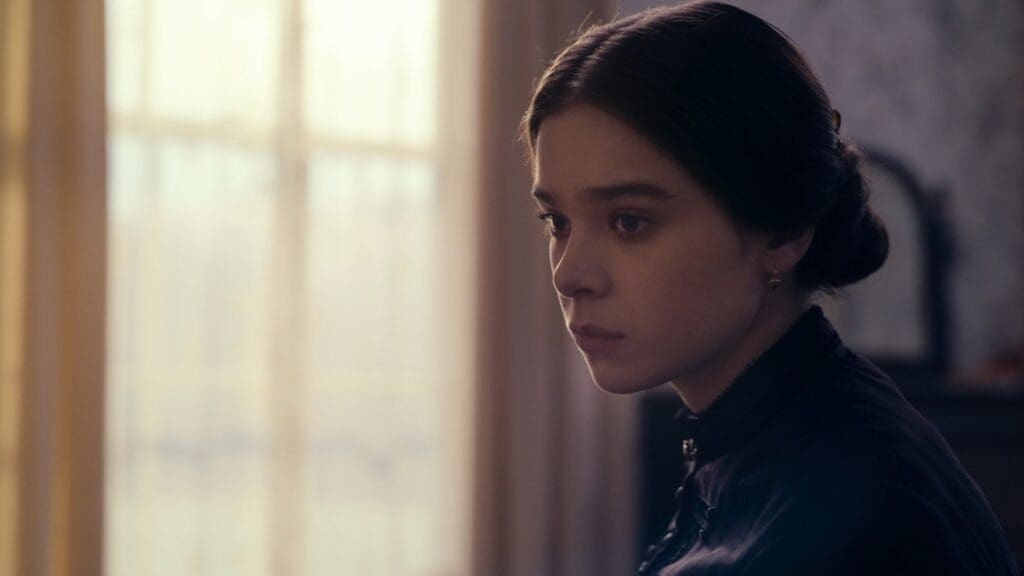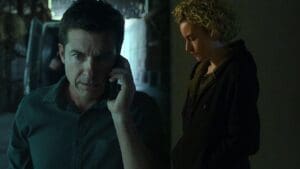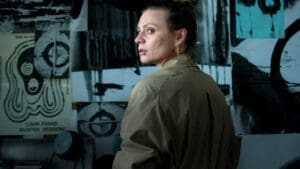Summary
Aunt Lavinia’s death ripples across the Dickinson family.
This recap of Apple TV+s Dickinson season 3, episode 1, ““Hope” is the thing with feathers” contains spoilers.
It’s an often muttered assertion that conflict and suffering produces great work. Think of Fleetwood Mac, or the COVID-19 Pandemic which has, in my opinion, yet to produce a single lasting work of great art (much like how it was said the Trump presidency would be “great for comedy”).
Emily Dickinson, this episode’s introduction explains, was at her most productive during the Civil War. Does this awful tragedy inspire some of her best work and can she be considered a “war poet?,” is a question this season will pose. The intro describes it as a “descent into a personal inferno,” but the season premiere shows the opposite; she’s the lighthouse in the storm that is her family’s extra and interpersonal drama.
It’s the final season of Dickinson, and I’m excited to see how the show decides to end. Even though it’s based in history, the past two seasons have depicted all sorts of exciting events and twists. For a premiere, the episode does a good job setting the mood and themes for the rest of the season.
Like many a Seinfeld episode would depict the inspiration for one of Jerry’s routines, so does Dickinson dramatize the inspiration for a poem. And this week we have ‘“Hope” is the thing with feathers” — one of her most popular (and criticized) works. Emily is buoyed by the concept of hope, and of being the source of hope for those she loves.
Dickinson season 3, episode 1 recap
But first we have a short, thrilling sequence of Emily on the front lines (does Steinfeld do her own stunts?), where the battlefield transitions into her bedroom; her gun becomes a pen. Dickinson creator Alena Smith (who also wrote the episode) is not playing around; Emily’s poetry writing is akin to her fighting, at least in Emily’s head.
The actual inspiration for the poem, and her desire spreads hope comes from the death of her aunt, Lavinia Norcross Norcross (she married her cousin, Emily Norcross (EN from now on) explains). The priest is shocked to learn that they are not burying a soldier (“I have no more time for the funeral of some old women…I am running way behind schedule”) and finishes the service at double speed.
The Dickinson family is horrified, but Emily is too distracted by a CGI bird to be offended. She catches a ride with her friend Death (not sure how the family didn’t notice she wasn’t in their carriage but one propelled by ghost horses but ah well), who’s not doing so hot himself. War is “taking all the fun out of death,” apparently, which is definitely not a complaint I expected. Apparently all the death now is boring and repetitive (amen to that) and asks her advice. He admires Emily for her passionate writing despite her “uneventful life,” and she expresses her newfound desire to spread hope. The war elevates her purpose, creating a reason for her poetry.
But her attempts to cheer up those around her are less than successful. She tries to console Betty, promising that her husband Henry is alive and well, to which Betty responds, “I thought poets were supposed to avoid clichés.”
Speaking of clichés, there’s not an inspired moment in Mr. Conkey’s awkward proposal to Emily, who he calls old (I guess she is technically in her thirties) and a bird, asking her to “tweet” for him. At the very least, it inspires the rest of the titular poem. But it won’t be enough to relive the pressure the war is causing the Dickinsons.
At most risk is Sue, now heavily pregnant and suffering from an unlucky husband more than ever (she married the wrong sibling!). Though she fantasizes about raising her child with Emily, Emily snubs her nose at this suggestion. She declares her poems are her children, displaying a childish fear of abandonment that no amount of waxing over “hope” seems to free her of.
And their pain is evermore exacerbated and caused by Austin, now comically drunk, still lusting after Jane, and talking back to his father. Edward worries that his son is becoming more and more like his own father, and his suspicions are far from alleviated by the episode’s climactic dinner scene.
The ending
As the family gathers, Edward mourns the country that he finds himself in, unable to recognize it as the one he once idolized. He compares the Civil War to a family breaking up, and is thankful that his is together. He’s followed by Emily, who exclaims her love for her family. “All I want to do is find a way to keep hope alive for you,” she says, and the Dickinson clan is grateful for her.
All but Austin, who embarks on a drunken rant about the family being a “joke” and resigned to misery. Stabbing back at his father, he accuses him of keeping he and his siblings “in cages,” and he has a point. But Austin’s fear that he is a failure, which he projects outwards, is based on the national mythos of “going west” and creating a business — something like that.
In an on-the-nose but nevertheless poignant metaphor, Edward’s heart gives out. He collapses on the floor, barely breathing. The horror in the scene, so beautifully escalated, is in how everyone reacts, most of the family remaining seated in horror. Only Emily actually attempts to help him. She is the only one who has hope.
Additional points
- Music Check: Introvert by Little Simz plays during the opening battle sequence — a thematically fitting song about wrestling with personal artistry during turbulent times.
- Some of the jokes fell pretty flat for me this episode, such as EN saying “Stop gaslighting me.” And the arrival of the Amherst gang. Their scene felt perfunctory, and they kept repeating the same jokes where they talk about the Civil War in the language people use around the COVID-19 pandemic/2016 Election/you name it. It’s starting to feel a little tired.
- I did however laugh at Maggie responding to EN’s self-pitying, “in abject bottomless despair” by saying “you still have a bottom ma’am.”
- We do, thankfully, get proof that Henry is still alive. He’s hitchhiking down south; why he would want to go there is the question on everyone (or at least that one guy’s) lips.
- Lavinia also learns that Lyman, her crush from the first season, is dead (apparently Ship has died too). Poor Lavinia, who like Emily is still unmarried, but for no lack of trying.
What did you think of Dickinson season 3, episode 1? Comment below.



